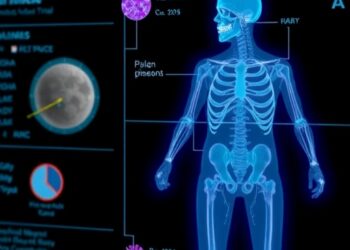Early on during the coronavirus pandemic, there were reports of cases of persistent post-infection symptoms. The World Health Organization (WHO) refers to such new or persistent symptoms twelve weeks after a corona infection that cannot be explained by other causes as a post-COVID-19 condition. In a recent study, scientists led by the University Medicine Halle evaluated the information from 109,707 participants in the German National Cohort (NAKO Gesundheitsstudie) on their self-reported health status with respect to post-infection symptoms. The survey took place in autumn 2022, in retrospect of the pandemic.
Early on during the coronavirus pandemic, there were reports of cases of persistent post-infection symptoms. The World Health Organization (WHO) refers to such new or persistent symptoms twelve weeks after a corona infection that cannot be explained by other causes as a post-COVID-19 condition. In a recent study, scientists led by the University Medicine Halle evaluated the information from 109,707 participants in the German National Cohort (NAKO Gesundheitsstudie) on their self-reported health status with respect to post-infection symptoms. The survey took place in autumn 2022, in retrospect of the pandemic.
At the time of the survey, more than 80 percent of respondents had received three or more COVID-19 vaccinations and 60 percent reported that they had already been infected with SARS-CoV-2. In the online questionnaire, the researchers asked about 21 possible post-COVID symptoms such as physical exhaustion, cardiovascular problems and cognitive impairment. 35 percent of those who experienced a corona infection reported at least one persistent post-COVID-19 symptom four to twelve months after infection. Of those who reported post-COVID-19 symptoms, a quarter reported nine or more of the symptoms.
Risk of post-COVID-19 condition lowest for Omicron variant
The scientists classified the virus variants responsible for a particular infection according to the periods of dominance in the national surveillance data in Germany. Infections up until December 2020 were classified as Wildtype, between January and June 2021 as Alpha variant, between July and December 2021 as Delta variant and from January 2022 as Omicron variant.
“As our analysis indicates, the virus variant has an impact on the risk of post-COVID-19 condition. The risk appears to decrease with the new virus variants. An Omicron infection was substantially less frequently associated with post-COVID-19 condition than earlier virus variants,” says Professor Dr. Rafael Mikolajczyk, Director of the Institute of Medical Epidemiology, Biometrics and Informatics at University Medicine Halle.
Lower risk of post-COVID-19 condition after fourth vaccination and in the case of repeated infections if the first infection was not followed by post-COVID-19 condition
“We also found a difference in case of repeated coronavirus infections. Those who did not develop post-COVID-19 condition after an infection and were infected again had a lower risk of post-COVID-19 condition than people who were infected for the first time,” adds Prof. Mikolajczyk.
The analysis also shows that a fourth vaccination reduced the risk of post-COVID-19 condition. For the phases in which previous virus variants dominated, the number of vaccinations did not appear to have a direct influence on the development of post-COVID-19 condition when comparisons were made within the respective virus variant.
“Even if this means that the previous vaccinations did not directly protect against post-COVID-19 condition, indirect protection can be assumed. This is because, according to the data currently available, those vaccinated had a lower probability of developing symptomatic coronavirus infections or suffering a severe infection, which in turn were associated with a higher risk of post-COVID-19 condition,” says Prof. Mikolajczyk.
The researchers also found a dynamic post-vaccination phase that depended on the time interval between vaccination and infection. If a coronavirus infection occurred within three months of vaccination, participants were more likely to report post-COVID-19 condition than people who had the infection at a longer interval from vaccination. Further studies are needed here, especially those that investigate the immunological repertoire prior to infection, to further explore this effect.
“Although the cause of post-COVID-19 condition is still not fully understood, the outlook for the future for all those who have not yet developed post-COVID-19 is positive given both the reduced risk resulting from Omicron infections and the massively reduced risk for those who already had a SARS-CoV-2 infection which was not followed by post-COVID-19 symptoms,” reports Professor Dr. André Karch from the University of Münster and last author of the study. “Our results are in line with the fact that the incidence of post-COVID-19 condition, as observed last winter, is decreasing substantially. The detailed information from the German National Cohort before and after the pandemic, as well as from the ongoing research in the cohort, forms a valuable basis for future studies on the remaining research questions related to COVID-19,” says Prof. Karch.
Mikolajczyk, R, Diexer, S, Klee, B et al. Risk of Post-COVID Condition Under Hybrid Immunity – Results from the German National Cohort (NAKO). Journal of Infection. June 2024
Journal
Journal of Infection
Method of Research
Data/statistical analysis
Subject of Research
People
Article Title
Likelihood of Post-COVID Condition in people with hybrid immunity; data from the German National Cohort (NAKO)
Article Publication Date
17-Jun-2024




